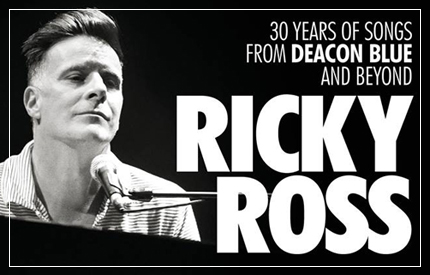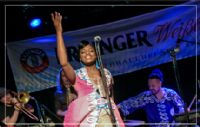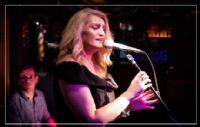Ricky Ross
Date: 10/11/2015
Gig Review

Outside Belfast's Empire Music Hall, the temperatures are lowering but the anticipation is raising as Deacon Blue's leading man, Ricky Ross, prepares to set off on a solo tour, billed as his most intimate yet.
Ah. "Solo". And "Intimate". Such words can be a double-edged sword, especially among nostalgic fans of the Glaswegian band. Will Ross sing Chocolate Girl and Dignity? What on earth will Fergus Sings The Blues sound like without its numerous backing instruments? And, perhaps most interestingly, how will he handle this set without the presence of Deacon Blue's leading lady – and his wife – Lorraine McIntosh?
Well, none of the aforementioned songs feature on the night (you can't please everyone, after all), but their absence, and McIntosh's (except in conversations), do not detract from what in the end is a distinct, rather versatile and memorable performance. Forget everything you think you know about Deacon Blue. Rather than take the easy option of regurgitating a series of the most popular hits with a piano and guitar, Ross instead opens a book – his Lyric Book – and invites us all to take a peek, taking everyone on a warm and intriguing musical journey with a series of well chosen numbers from a catalogue stretching back three decades. It's not so much re-inventive for Ross as it is revelatory for us – this is who the Dundee-born troubadour is beneath the gloss of the band that made his name, a witty, affable and mighty fine songwriter with a powerful, humane stage presence.
Support comes from local guy Owen McGarry and his guitar. He admits to normally playing songs with a full band, and perhaps that shows in his initial nerves. But he is meticulous and enthusiastic, aligning a recognisable Belfast brogue and a pleasant manner with vocals that impress more and more with their range and tempo as his short set goes on. He has an endearing everyman vibe, one that lends itself well to the Empire's acoustics and sets us up nicely for what's to follow.
One does wonder if Ricky Ross must have pondered including more of Deacon Blue's early classics in his set list when he enters to simply rapturous applause. The Stars In Their Eyes-esque reception to the openings of When Will You (Make My Telephone Ring), and especially Wages Day, supports this theory. But Ross generally sticks to his guns in a show that is as much about concentration and adaptation for him as it is the audience. His choice of evening tuneage is enlightening, a fitting reflection on a multitude of life experiences for the performer as he nears the age of sixty, and an equally fitting reflection on the moods and landscape of Belfast itself. In his words, Belfast's Botanic Avenue is "a lovely part of town" and he intends to do it justice. Which he does.
The passage of time may have forced him to curtail his renowned bursts of loudness – to some, this is surely a relief – but it has not withered him; from the very start, Ross's delivery and diction are as strong, clear and distinctive as ever. He talks and sings about Christmas, fatherhood, dogs (yes) and landscapes. He performs conversational pieces. He encourages sing-alongs of Pale Rider and Real Gone Kid, the latter unsurprisingly more excitable and energising than the former.
And all of it feels like a uniquely relaxing, and winning, exploration of the soul in the company of friends. It can be regretful, it can sometimes seem frivolous, but it is never bitter or bombastic, the serious musicianship relatably and reliably interspersing itself with a collection of funny and rather poignant anecdotes. One leaves the Empire with a new and heartfelt appreciation of Ricky Ross as musician, entertainer and storyteller.
Simon Fallaha
Ah. "Solo". And "Intimate". Such words can be a double-edged sword, especially among nostalgic fans of the Glaswegian band. Will Ross sing Chocolate Girl and Dignity? What on earth will Fergus Sings The Blues sound like without its numerous backing instruments? And, perhaps most interestingly, how will he handle this set without the presence of Deacon Blue's leading lady – and his wife – Lorraine McIntosh?
Well, none of the aforementioned songs feature on the night (you can't please everyone, after all), but their absence, and McIntosh's (except in conversations), do not detract from what in the end is a distinct, rather versatile and memorable performance. Forget everything you think you know about Deacon Blue. Rather than take the easy option of regurgitating a series of the most popular hits with a piano and guitar, Ross instead opens a book – his Lyric Book – and invites us all to take a peek, taking everyone on a warm and intriguing musical journey with a series of well chosen numbers from a catalogue stretching back three decades. It's not so much re-inventive for Ross as it is revelatory for us – this is who the Dundee-born troubadour is beneath the gloss of the band that made his name, a witty, affable and mighty fine songwriter with a powerful, humane stage presence.
Support comes from local guy Owen McGarry and his guitar. He admits to normally playing songs with a full band, and perhaps that shows in his initial nerves. But he is meticulous and enthusiastic, aligning a recognisable Belfast brogue and a pleasant manner with vocals that impress more and more with their range and tempo as his short set goes on. He has an endearing everyman vibe, one that lends itself well to the Empire's acoustics and sets us up nicely for what's to follow.
One does wonder if Ricky Ross must have pondered including more of Deacon Blue's early classics in his set list when he enters to simply rapturous applause. The Stars In Their Eyes-esque reception to the openings of When Will You (Make My Telephone Ring), and especially Wages Day, supports this theory. But Ross generally sticks to his guns in a show that is as much about concentration and adaptation for him as it is the audience. His choice of evening tuneage is enlightening, a fitting reflection on a multitude of life experiences for the performer as he nears the age of sixty, and an equally fitting reflection on the moods and landscape of Belfast itself. In his words, Belfast's Botanic Avenue is "a lovely part of town" and he intends to do it justice. Which he does.
The passage of time may have forced him to curtail his renowned bursts of loudness – to some, this is surely a relief – but it has not withered him; from the very start, Ross's delivery and diction are as strong, clear and distinctive as ever. He talks and sings about Christmas, fatherhood, dogs (yes) and landscapes. He performs conversational pieces. He encourages sing-alongs of Pale Rider and Real Gone Kid, the latter unsurprisingly more excitable and energising than the former.
And all of it feels like a uniquely relaxing, and winning, exploration of the soul in the company of friends. It can be regretful, it can sometimes seem frivolous, but it is never bitter or bombastic, the serious musicianship relatably and reliably interspersing itself with a collection of funny and rather poignant anecdotes. One leaves the Empire with a new and heartfelt appreciation of Ricky Ross as musician, entertainer and storyteller.
Simon Fallaha




































